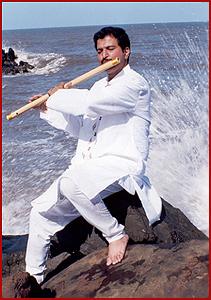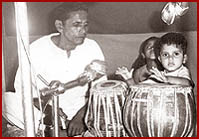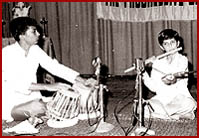Invitation
Program
Samraat Club
Pt. Hariprasad Chaurasia
Ustad Shujaat Husain Khan
Pt. Yogesh Samsi
Rupak Kulkarni
Marina Alam
Photos
Reviews
|
| International Festival of Indian Classical Music: September 20, 2006 |
| |
| Rupak Kulkarni |
 The "Classical" Rupak: with music blown into his breath by father Late Pt. Malhar Kulkarni, Rupak has blossomed under the finest tutelage of flute maestro Pandit Hariprasad Chaurasia to become an outstanding exponent of "Maihar Gharana". As a "Ganda Bandh" shagird of Pandit Hariprasad Chaurasia since the tender age of 12, Rupak with arduous training and hard work, has mastered "Dhrupad, Khayal and Tantrakari ang" (style) equally well. In fact, his recital is always a rare treat combining Dhrupad and Khayal gayaki, melodious alap and scintillating "Tatkar" (tounging technique used for Jhala) innovative improvisation with mesmerising "Layakari", superb breath control and dexterous finger work. The "Classical" Rupak: with music blown into his breath by father Late Pt. Malhar Kulkarni, Rupak has blossomed under the finest tutelage of flute maestro Pandit Hariprasad Chaurasia to become an outstanding exponent of "Maihar Gharana". As a "Ganda Bandh" shagird of Pandit Hariprasad Chaurasia since the tender age of 12, Rupak with arduous training and hard work, has mastered "Dhrupad, Khayal and Tantrakari ang" (style) equally well. In fact, his recital is always a rare treat combining Dhrupad and Khayal gayaki, melodious alap and scintillating "Tatkar" (tounging technique used for Jhala) innovative improvisation with mesmerising "Layakari", superb breath control and dexterous finger work.
Rupak has had the rare distinction of having connoisseurs and music maestros such as Pandit Ravi Shankar and Pandit Bhimsen Joshi in his audience, who have lauded his music.
With concerts across the globe in countries such as Australia, America, Russia, Japan, Africa, England, France and others, Rupak has acquired a dignified maturity in his playing at an enviably early age. His concert at "Asian Super Flautist Festival" in Japan is particularly a memorable one.
In India, Rupak has performed at almost all prestigious music conferences. Be it, Sawai Gandharva, Pune; Tansen Samaroh, Gwalior; Vishnu Digamber Paluskar Samaroh, New Delhi; Times of India 150 years celebration concerts and Bharatiya Vidya Bhavan, Kolkatta; Hirabai Badodekar Smruti Samaroh and Gunidas Sammelan, Mumbai.
The "Filmi" Rupak: Rupak has lent his musical prowess to many melodies hitting the chart busters. Has worked with renowned music directors from Bollywood. Films such as Kabhi Khushi Kabhi Gam (K3G), Fiza, Mr. and Mrs. Iyer etc. have him playing in not just the main songs but also in the background scores, arousing emotions varying from pathos to exuberance.
The "Fusion" Rupak: Rupak has collaborated with many renowned musicians from the West to create scintillating music. Some of them being…
- Piano - C. C. Kreusch (Germany); Oola Melander (Sweden)
- Drums - Trilok Gurtu; Taufiq Qureshi; Reto Weber and Stephen Rigert (Switzerland)
- Guitar - Marc Liebeskind (Switzerland)
- Saxophone - Philip Harpen (France)
- Djembe - Adama Drame (West Africa)
"Monsoon Magic" and "Unwind" are Rupak's bold and successful endeavours with fusion music. Besides, he has composed and performed along with his own fusion group "Sonakshi".
|
| |
| The Gharana or family is a school of a particular style of singing or playing instruments, or a traditionally characteristic individual style. The Gharanas are particularly relevant to the Hindustani Classical music. The birth of Gharanas must have taken place in the 18th century with the idea of preserving the tradition of music and the musical compositions. A Gharana has got a particular discipline, system and style. The character and style of traditionally disciplined music of a gharana remains with one generation only, and in due course one of the brilliant pupils adds his own individual contribution and creates a new style of performing.
The Maihar Gharana: The Maihar Gharana of instrumental Khayal was born in the middle of the 19th century, but it has had tremendous influence on the Hindustani instrumental music in the last fifty years. It was born inside the Rampur gharana from which the actual forms of musical composition (gat) originate (Masitkhani gat for the slow compositions and Razakhani gat for the fast ones).
The credit for developing this style of music goes to Ustad Allauddin Khan. Unlike many other gharana founders, Ustad Allaudin Khan did not come from a family of musicians. But he managed to get tutored by one of the best beenkars of his time, Ustad Mohammad Wazir Khan of Rampur Seniya Beenkar Gharana. From those beginnings he managed to develop his own style of instrumental music - a combination of Dhrupad and Khayal.
Played on the classical structure of the raga, but with a preference for composite ragas, this music consists of a first part of pure improvisation, the alap, then of one or two compositions accompanied by the tabla. In the second part the musicians develop various forms of improvisation on the notes of the composition and on the tal (the division of the rhythm cycle).
The many disciples of Maihar Gharana include Ustad Allauddin Khan's son - Ustad Ali Akbar Khan on Sarod, son-in-law - Pandit Ravi Shankar on Sitar, Nikhil Banerjee on Sitar, Pandit Hariprasad Chaurasia on Flute, and from the current generation who carry the torch of Maihar Gharana forward, among others; Rupak Kulkarni on Flute. |
| |
 At the tender age of 18 months, when most of us did not think beyond our feeds, Rupak was at his first concert, fulfilling his father's desire of his becoming a tabla player At the tender age of 18 months, when most of us did not think beyond our feeds, Rupak was at his first concert, fulfilling his father's desire of his becoming a tabla player
Age 4 …………first public tabla performance, Mumbai
By the time he was 8 years young, Rupak had found his mentor in Pandit Hariprasad Chaurasia, and was greatly influenced by his music. He then began practicing on the flute by himself, followed by basic lessons from father. At 11, Rupak had his first flute performance at the Darbar Hall, Baroda.
 1983 saw Rupak becoming the first "Ganda Bandh Shagird" of Pandit Hariprasad Chaurasia. 1983 saw Rupak becoming the first "Ganda Bandh Shagird" of Pandit Hariprasad Chaurasia.
1984, and Rupak had the honor of accompanying his Guru for the first time at the Gunidas Sammelan, Mumbai.
March 2002: Rupak gave a lecture demonstration at the prestigious Trinity College of Music, London, courtesy - Art-Music Foundation. |
| |
|
| |
|

